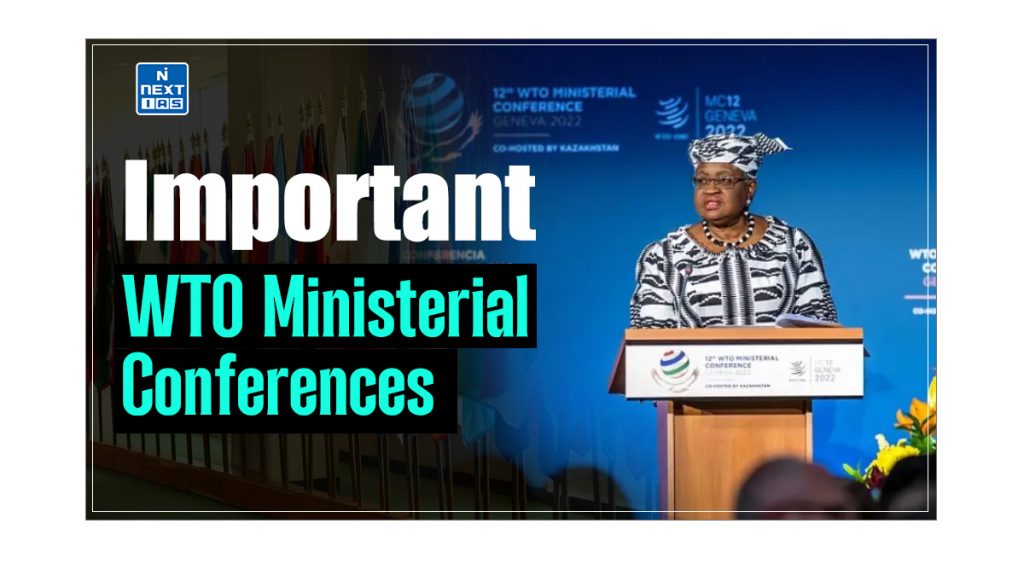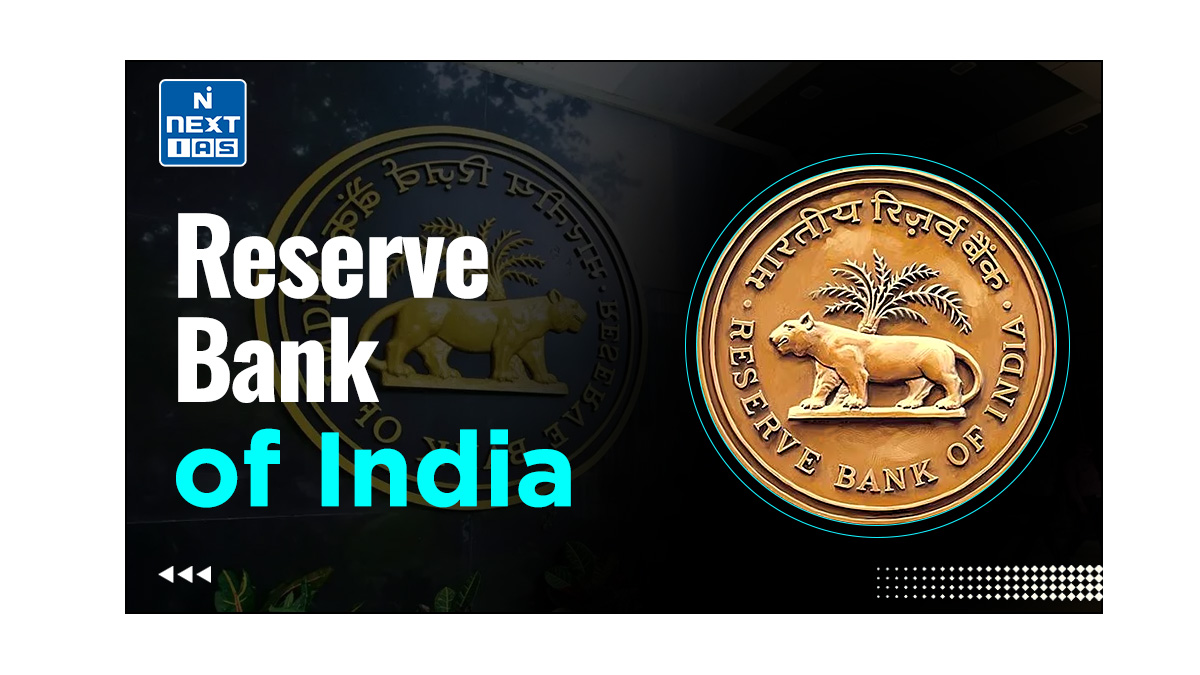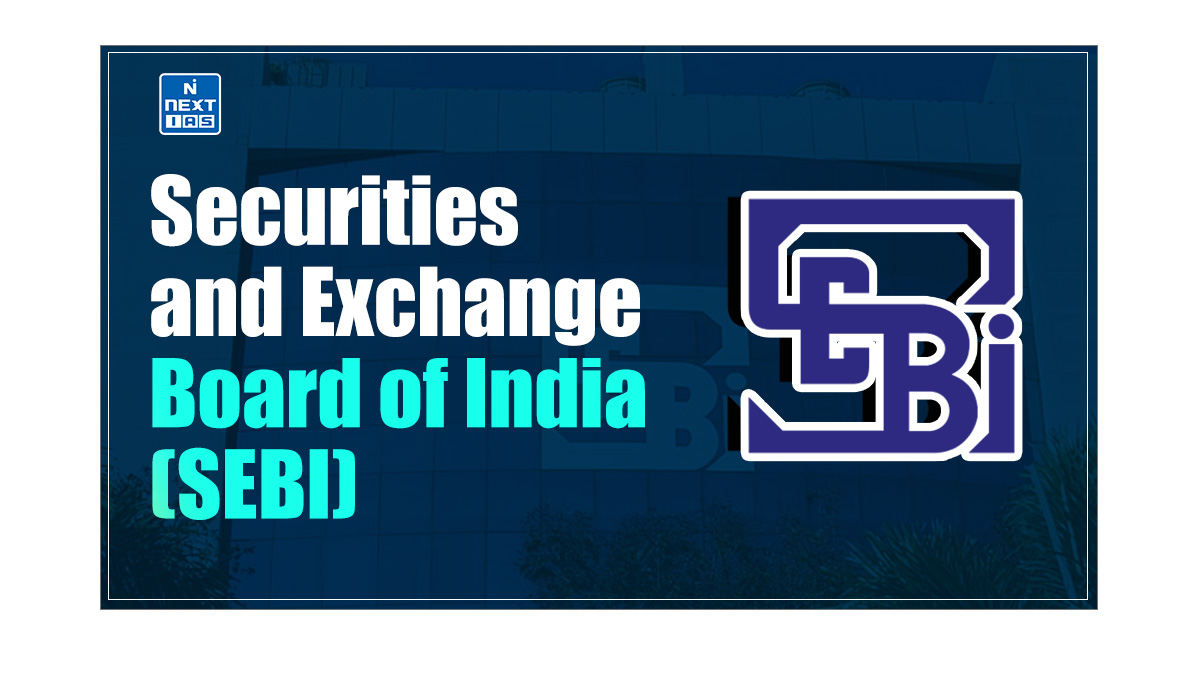
WTO Ministerial Conferences play a crucial role in giving global trade a direction. While numerous WTO Ministerial Conferences have been held till now, some of them stand out for their significant impact on the global trading system. This article aims to study in detail some Important WTO Ministerial Conferences, their major outcomes, and their effects on global trade.
About WTO Ministerial Conference (MC)
- The Ministerial Conference (MC) is at the top of the organisational structure the World Trade Organisation (WTO).
- It is the supreme governing body that makes the final decisions on all matters.
- It is constituted by representatives of all the member countries, who are, usually, the Ministers of Trade of their respective countries.
- It usually meets after every 2 years.
- Accordingly, many WTO Ministerial Conferences have occurred since the establishment of the WTO.
| About World Trade Organization (WTO) – World Trade Organization (WTO) is a global multilateral organization established in 1995 for the rules-based trading between the nations of the world. – It is a global membership group that promotes and manages free trade. – It serves as a forum for governments to negotiate trade agreements as well as settle trade disputes. Read our detailed article on the World Trade Organization (WTO). |
Important WTO Ministerial Conferences
- Some WTO Ministerial Conferences stand out from others in the sense that their outcomes have proved to be milestones in the journey of evolution of global trade and commerce.
- Some of such important WTO Ministerial Conferences and their major outcomes have been described in detail as follows.
Doha Ministerial Conference and Doha Development Agenda (DDA) 2001
- The Agenda was officially launched at the 4th WTO Ministerial Conference (MC4) in Doha, Qatar, in November 2001.
- Its goal was to bring about significant reform in the international trading system by introducing lower trade barriers and updating trade rules.
- Doha round is the first to focus on helping developing countries in joining the global marketplace and boosting their economies as a result.
- WTO members agreed that to realize this objective, the rules in each of the areas must be appropriately designed.
- The main negotiating issues in the Doha Round and major negotiation outcomes thereon are listed as follows:
Agriculture
- It was agreed that agriculture must be stripped of all policy distortions, including the unacceptably high levels of subsidies that provide unfair advantages to the large conglomerates controlling global trade in commodities.
- It was also agreed that the existing Agreement on Agriculture (AoA) would be revised to address issues related to smallholder agriculture and provide developing countries with new tools to tackle concerns about food security, rural development, and protection of rural livelihoods.
- These instruments are:
Special Safeguard Mechanism (SSM)
- WTO’s Special Safeguard Mechanism is a protection measure allowed for developing countries to impose contingency restrictions on agricultural imports that are causing injuries to its domestic farmers.
- The contingency measure is the imposition of tariffs if the import surge causes welfare loss to the domestic poor farmers.
- SSM is allowable only to developing countries, but the design of the exact rules of the SSM created conflict among the WTO members.
Special Products
- At the 2005 WTO Ministerial Conference in Hong Kong, members agreed to permit developing countries to “designate an appropriate number of tariff lines as Special Products (SPs)” based on considerations of “food security, livelihood security, and rural development”.
- These products do not come under the Tariff reduction agreement under WTO.
Non-Agricultural Market Access (NAMA)
- NAMA covers fish and fish products, manufacturing products, fuel and mining products, and forestry products.
- These products are not covered by the Agreement on Agriculture (AoA) or the negotiations on services.
- NAMA calls for a reduction or elimination of tariffs, particularly on exportable goods of interest to developing countries.
- The Doha Talks also required adequate and appropriate flexibilities to be provided for protecting economically vulnerable non-agriculture industries.
- The WTO considers the NAMA negotiations important because NAMA products account for almost 90% of the world’s merchandise exports.
TRIPS (Compulsory License vs. Patent Protection)
- The issue involves balancing the interests of pharmaceutical companies in developed countries that hold patents on medicines with the public health needs of developing countries.
- It was agreed that a waiver under the TRIPS agreement be allowed to a member country to export pharma products made under Compulsory Licensing to Least Developed countries and certain other member countries.
- It also allows members to not to allow the evergreening of Patents.
What is Evergreening?
Evergreening is a strategy for extending the term of a granted patent which is about to expire without increasing therapeutic efficacy in order to retain royalties.
Special and Differential Treatment to Developing Countries
- In the Doha round, members agreed that the Developing and the Least Developed Countries (LDCs) will continue to be eligible for favorable treatment.
- Duty-Free Quota Free Access should be given to Least Developed Countries (LDCs).
Bali Ministerial Conference and Bali Package
- One of the most important WTO Ministerial Conferences is the Ninth Ministerial Conference of WTO, which was held in Bali, Indonesia in December 2013.
- The key issues discussed in this meet included trade facilitation, agriculture negotiations, cotton, least-developed countries, monitoring mechanisms, small and vulnerable economies, e-commerce, non-violation of intellectual property, etc.
- The outcome of this conference was called Bali Package which was the first agreement reached through the WTO that is approved by all its members.
- Major elements of the Bali Package are as follows:
Peace Clause
- It allows countries such as India to continue to freely procure and stock grains for the public distribution system even if subsidies resulting from these breach limits under the WTO’s Agreement on Agriculture (AoA).
- The peace clause provided a four-year reprieve, during which no country would be penalized for any excessive expenditures on food security programs to protect against food shortage.
Trade Facilitation Agreement (TFA)
- The TFA contains provisions aimed at expediting the movement, release, and clearance of goods, including those in the transit.
- It also outlines measures for effective cooperation between customs and other relevant authorities on trade facilitation and customs compliance matters.
Nairobi Ministerial Conference
- The 10th Ministerial Conference (10th MC) of the WTO stands out as one of the important WTO Ministerial Conferences.
- It was held in Nairobi, Kenya during 15-19 December 2015.
- The agenda of this meeting was to take forward issues that were unresolved during last ministerial conference in Bali in 2013.
- The components of the Nairobi Package were:
Elimination of Export Subsidies
- Developed countries such as the United States will need to eliminate the farm export subsidies and other scheme which unfairly agricultural exports.
Flexibility for Developing Countries
- Developing countries were granted the flexibility to cover marketing and transport costs for agricultural exports and food aid in a manner that does not disrupt local markets.
Simplification of Conditionalities
- Simplifying the conditions that exporters from the poorest countries have to meet so that their products benefit from trade agreements (such as the rules of origin).
- Giving more opportunities to businesses from the poorest countries to provide services in 164 member countries of the WTO.
Information and Technology Trade
- The countries struck a deal on IT trade whereby, they would eliminate the tariffs on 201 IT products per year.
- The idea is to make all IT products duty-free by 2019.
Public Stock-Holding
- No final decision was taken on public stock-holding as well as Special Safeguard Mechanisms (SSM).
Buenos Aires Ministerial Conference
As one of the most important WTO Ministerial Conferences, the 11th Ministerial Conference of WTO was held in Buenos Aires, Argentina from 10th to 13th December 2017.
Stalemate on Public Stock-Holding
- The 11th Ministerial Conference ended in a stalemate on issue of public stockholding and no permanent solution to the peace clause could be reached.
- However, the peace clause will continue to be in place until any successful resolution on the issue takes place.
Subsidy on Fisheries
- Some progress did take place in furthering the negotiations on the fisheries subsidies cut.
- However, no commitment was made at the end of the meeting.
- Member countries did agree to secure a deal on the elimination of fisheries subsidies by the next ministerial in December 2019.
Buenos Aires Declaration on Women and Trade
- Nearly three-fourths of the 164-member World Trade Organisation (WTO) have supported a declaration seeking women’s economic empowerment by expeditiously removing barriers to trade.
- The members have agreed to explore and find ways to best tackle women’s general lack of access to trade financing and sub-optimal participation of women in public procurement markets.
- Inclusion of women-led businesses, in particular, small firms in value chains has also been identified as a theme related to trade and the economic empowerment of women.
Geneva Ministerial Conference
- The General Council agreed on 26 November 2021 to postpone the 12th Ministerial Conference of WTO (MC12) due to the COVID-19 Pandemic.
Conclusion
The WTO Ministerial Conferences have played a pivotal role in shaping the global trading landscape. While they have achieved significant milestones, they also highlight the complexities and challenges of multilateral trade negotiations. As the world continues to evolve, WTO Ministerial Conferences will be crucial in ensuring that the global trading system remains robust, inclusive, and responsive to new challenges and opportunities.
Frequently Asked Questions
What is meant by the WTO Ministerial Conferences?
The WTO Ministerial Conferences occur every 2 years and is the supreme governing body that makes the final decisions on all matters.
What are some important WTO Ministerial Conferences?
Some WTO Ministerial Conferences stand out as very important WTO Ministerial Conferences because of the decisions taken therein. The list of some important WTO Ministerial Conferences include – Doha Ministerial Conference, Bali Ministerial Conference, Buenos Aires Ministerial Conference, etc.





